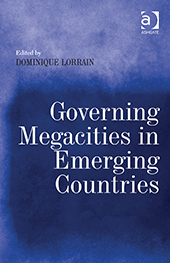Governing Megacities in Emerging Countries

In this edited volume, Dominique Lorrain invites authors to explore infrastructure-related challenges of governing Shanghai, Mumbai, Cape Town and Santiago de Chile through looking at the profound changes that have occurred in their institutional structures since the late 20th century.
The book emerged from an interest in re-introducing technical phenomena related to the built environment of megacities into the social sciences and at the same time challenging the standard economic fiction of perfect markets and the city as a collective and strategic actor.
The book uses examples of electricity, housing, water and transport, and highlights their central role in the development of a city. Looking beyond the physical changes, to the institutional dynamics and structures, brings all authors to the basic questions of the governability that all megacities are confronted with.
The book highlights, on the one hand, how multiple actors struggle to define structures and visions (e.g. the Mumbai Vision) that allow cities to frame the political economy of urban development in an inclusive manner. This refers to the processes (such as the use of participatory tools or the allocations of responsibilities in public–private partnerships) as well as the outcomes that are needed to deal with challenges related to growing populations, economic growth, and the emergence of so-called growth coalitions.
On the other hand, it highlights the impacts of the historical legacies of radical transformations (e.g. after the dictatorship in Santiago and apartheid in Cape Town), which imply that pressing locally-specific problems require these cities to act fast and ad hoc on particular challenges such as housing shortages and lack of water and transport opportunities.
Based on surveys, literature studies and interviews, the different chapters tease out the multiple tensions around which these challenges emerge, which can broadly be framed as being between the state and market, lack of resources and need for investments, provision of social services and economic sustainability, centralization and decentralization, and institutional redundancy and complexity, which all influence the degrees of power, control and legitimacy of various actors.
In sum, readers will find in-depth descriptions and analyses of the turbulent and radical changes that the four cities have undergone in terms of their infrastructure networks. Numerous examples reveal in detail how the assessment of complex long-term institutional changes on the local level can contribute to a discussion on the requirements for an institutional infrastructure that enables institutional rules to rule and allows for megacities to be governed despite their mega-challenges.
Book note prepared by Julia Wesely
Search the Book notes database
Our Book notes database contains details and summaries of all the publications included in Book notes since 1993 - with details on how to obtain/download.
Use the search form above, or visit the Book notes landing page for more options and latest content.
For a searchable database for papers in Environment and Urbanization, go to http://eau.sagepub.com/

